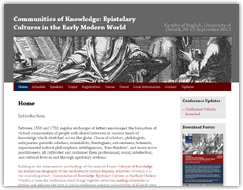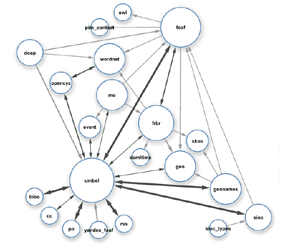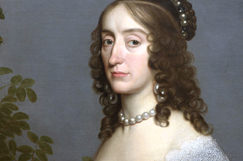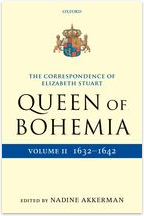![Caricature, from a South Sea Bubble card. 1720. (Reproduced in Charles Mackay, Extraordinary Popular Delusions and the Madness of Crowds. [London, 1857], p. 61; image sourced from Wikimedia Commons).](../../wp-content/uploads/2012/07/Bubble_Cards.png) As world economies stagger from one crisis to the next and headlines flip-flop between the Eurozone emergency and the scandal of inter-bank lending rate fixing, EMLO provides valuable historical insights into financial turbulence and the effects of similar bubbles and crashes. We may face fresh causes of fiscal breakdown today, but the boom and bust cycle is far from new.
As world economies stagger from one crisis to the next and headlines flip-flop between the Eurozone emergency and the scandal of inter-bank lending rate fixing, EMLO provides valuable historical insights into financial turbulence and the effects of similar bubbles and crashes. We may face fresh causes of fiscal breakdown today, but the boom and bust cycle is far from new.
One of the best-known early modern monetary madnesses surrounds the South Sea Bubble and EMLO teems with letters charting its frenzied course, from punters investing and reaping rewards (Heneage Finch asks Hilkiah Bedford to ‘receive on his behalf the interest on £600 East India Bonds’), to the grim aftermath as international recession set in.
Our letters chart the bubble as it swells, bursts, and stocks plummet dramatically, often in a matter of hours. In early August 1720 shares were worth £1,000; eight weeks later they stood at a mere £150. Swathes of society were ruined. Reports of fraud and wrongdoing proliferated. Parliament struggled to deal with the situation. Taxes were levied. Banks tried to enforce regulations and conditions, refusing ‘to discuss any Government proposals about the S.Sea affairs unless Mr. Walpole is made First Comr. of the Treasury’. A committee was established to investigate, but in the words of Thomas Isted ‘[a]ll thoughts are at present on the Directors of the South Sea Company who by their villanies have brought this ruin on the nation’. Heads rolled (albeit not from the block), reputations lay in tatters. A bizarre mock funeral, organised by Duke of Wharton, may have been conducted through the streets of London (see John Carswell’s 1960 publication The South Sea Bubble), but this was far from the end of the affair; in an increasingly interlinked and interdependent early modern world, financial crises were international problems and, in the same year as the South Sea debacle, France saw the collapse of Laws’ Mississippi bubble.
It was a time of high anxiety, with ‘goldsmith and merchants falling’ and money scarce. Repercussions ricocheted far and wide. William King, archbishop of Dublin wrote ‘The South Sea and the interruption of the trade with France & Spain has drained Ireland of money’, and in scholarly quarters Sir Anthony Wescome lamented he was unable to afford more of Hearne’s publications. Inflation soared as ‘The South Sea makes everything dear’. Some were fortunate to preserve a portion of their family’s wealth (including Lord Sutherland who, as First Lord of the Treasury, was one of the political casualties); others were not, and begging letters abound. As countless enterprises suffered setbacks and stringent cuts, those seeking charity faced an uphill struggle even during the boom itself, as politician and architect George Clarke revealed when, in April 1720, he sent ‘two old shirts & two guineas to some decayed gentleman for whom A.C. has appealed, fears that in spite of the affluence caused by the rise of the South Sea Stock there is little charity stirring’. Across Europe, lives were altered as a result of the crash, and ‘in almost everyone’s face’ Dr John Harris picked out ‘some fear or fatal mark of ye South Sea Project’.
From these depressingly familiar circumstances, one slim silver lining emerges tucked in a letter from a young physician called Samuel Jebb. Nuptial bliss with his beloved seemed increasingly likely following ‘her aunt’s losses in the South Sea’ as the social distance between the two lovers was correspondingly diminished. A form of justice, perhaps.
Miranda is editing metadata from the Bodleian card catalogue of correspondence for our union catalogue, Early Modern Letters Online. On a regular basis, she brings us hand-picked and contextualised records.
 Online booking is now open for Communities of Knowledge: Epistolary Cultures in the Early Modern World, the third and final Project conference, which will take place in the English Faculty, Oxford, on 20-22 September 2012. Organised by Rhodri Lewis and Noel Malcolm, the event brings together seventeen leading authorities to explore and celebrate the ways in which intellectual interests and activities of all kinds were pursued and propagated through correspondence during the long seventeenth century. For provisional programme information, a steadily growing lists of speaker profiles and abstracts, and to book online, please visit the conference website. The deadline for registrations is Friday, 7 September 2012.
Online booking is now open for Communities of Knowledge: Epistolary Cultures in the Early Modern World, the third and final Project conference, which will take place in the English Faculty, Oxford, on 20-22 September 2012. Organised by Rhodri Lewis and Noel Malcolm, the event brings together seventeen leading authorities to explore and celebrate the ways in which intellectual interests and activities of all kinds were pursued and propagated through correspondence during the long seventeenth century. For provisional programme information, a steadily growing lists of speaker profiles and abstracts, and to book online, please visit the conference website. The deadline for registrations is Friday, 7 September 2012.
![Caricature, from a South Sea Bubble card. 1720. (Reproduced in Charles Mackay, Extraordinary Popular Delusions and the Madness of Crowds. [London, 1857], p. 61; image sourced from Wikimedia Commons).](../../wp-content/uploads/2012/07/Bubble_Cards.png) As world economies stagger from one crisis to the next and headlines flip-flop between the Eurozone emergency and the scandal of inter-bank lending rate fixing, EMLO provides valuable historical insights into financial turbulence and the effects of similar bubbles and crashes. We may face fresh causes of fiscal breakdown today, but the boom and bust cycle is far from new.
As world economies stagger from one crisis to the next and headlines flip-flop between the Eurozone emergency and the scandal of inter-bank lending rate fixing, EMLO provides valuable historical insights into financial turbulence and the effects of similar bubbles and crashes. We may face fresh causes of fiscal breakdown today, but the boom and bust cycle is far from new.
 Following on from our participation in a Wikimedia-sponsored data workshop
Following on from our participation in a Wikimedia-sponsored data workshop 



 Join
Join 